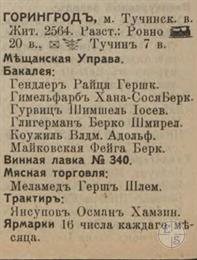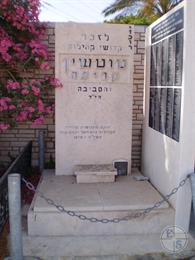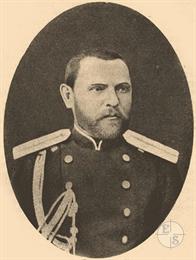Horyngrad
Rivne district, Rivne region
Sources:
- Jewish encyclopedia of Brockhaus & Efron
- Russian Jewish encyclopedia. Translated from Russian by Eugene Snaider
- Jewish electronic encyclopedia World ORT. Tsam Tsvi Herts
- Yad Vashem. Horyngrod
- The All South-Western Territory: reference and address book of the Kyiv, Podolsk and Volyn provinces. Printing house L.M. Fish and P.E. Wolfson, 1913
Photo:
- David Shay, Wikipedia. Tuczyn and Horyngrod Jewery Holocaust memorial at Holon Cemetery
- Jewish encyclopedia of Brockhaus & Efron
- Russian Jewish encyclopedia. Translated from Russian by Eugene Snaider
- Jewish electronic encyclopedia World ORT. Tsam Tsvi Herts
- Yad Vashem. Horyngrod
- The All South-Western Territory: reference and address book of the Kyiv, Podolsk and Volyn provinces. Printing house L.M. Fish and P.E. Wolfson, 1913
Photo:
- David Shay, Wikipedia. Tuczyn and Horyngrod Jewery Holocaust memorial at Holon Cemetery
Horyngrad-First (also Horinhrod, Krupy; Kripa in Yiddish), a village in the Rivne district. Founded in the 16th century. In 16-18 Ekakh - as part of the Commonwealth. Since 1793 - as part of the Russian Empire. In the 19th - beginning of the 20th century - the small township near Tuchyn of Rivne district of the Volyn province. In 1919–39 - in the Volyn Voivodeship as part of Poland, in 1939–91 - as part of the Ukrainian SSR.
In 1784, 40 Jews lived in Horyngrad,
in 1787 - 54,
in 1847 - 316,
in 1863 - 380,
in 1897 - 540 (28%),
In 1921 - 307 Jews (15%).
There were Jews living in Horyńgrуd in the second half of the 18th century.
In 1777, Horyngrad received the rights of the city.
In 1863 there was a synagogue.
In the 1920s there were 2 synagogues.
In the 20th century, the rabbis were Gordon, then Malinna (before Shoah period).
In 1913, Jews owned all 7 shops in the township.
In the interwar period, most local Jews were petty traders and peddlers. Some Zionist parties and their youth movements (HeHalutz and Beitar) were active in the town.
In 1784, 40 Jews lived in Horyngrad,
in 1787 - 54,
in 1847 - 316,
in 1863 - 380,
in 1897 - 540 (28%),
In 1921 - 307 Jews (15%).
There were Jews living in Horyńgrуd in the second half of the 18th century.
In 1777, Horyngrad received the rights of the city.
In 1863 there was a synagogue.
In the 1920s there were 2 synagogues.
In the 20th century, the rabbis were Gordon, then Malinna (before Shoah period).
In 1913, Jews owned all 7 shops in the township.
In the interwar period, most local Jews were petty traders and peddlers. Some Zionist parties and their youth movements (HeHalutz and Beitar) were active in the town.
 |
 |
| Horyngrad in the 1913 reference book | Tuchyn and Horyngrad (Krupy) Holocaust memorial at Holon Cemetery, 2009 |
The Germans occupied Horyngrad in the first days of July 1941. On July 6, fourteen (or, according to another source, twenty-five) Jewish men were shot dead by a Ukrainian police unit outside of town, at a site near the village of Babin. On the next day, some local Ukrainians carried out a pogrom in the town, in which some thirty Jews were murdered; another ten died later of their wounds.
In September 1942, the remaining Jews of Horyngrad (mostly women and children) were resettled in the ghetto of the nearby town of Tuchyn. They were killed during the liquidation of the Tuchyn Ghetto.
In Horyngrad was born Herzel Yankel Tsam (Russian: Герцель Янкелевич Цам, 1835–1915) a Jewish military officer in the Russian Empire, one of only nine Jewish officers in the Russian army in the 19th century who didn't convert to Christianity.
Drafted as a 17-year-old cantonist, Tsam served in Tomsk, Siberia. Tsam became an officer in 1873 (his fellow officers attested to his qualities in the promotion petitions) and, after forty-one years of service, he was retired with a rank and pension of captain. The promotion was granted on the day of his retirement, so he would have the pension, but wouldn't be able to serve as a captain. An able commander and administrator, he turned one of the worst companies of his regiment into one of the best.
After retirement, Tsam took an active part in the Jewish community of Tomsk.
He wrote and published the book “The history of the emergence of the Military Prayer School in Tomsk” (Tomsk, 1909).
In September 1942, the remaining Jews of Horyngrad (mostly women and children) were resettled in the ghetto of the nearby town of Tuchyn. They were killed during the liquidation of the Tuchyn Ghetto.
In Horyngrad was born Herzel Yankel Tsam (Russian: Герцель Янкелевич Цам, 1835–1915) a Jewish military officer in the Russian Empire, one of only nine Jewish officers in the Russian army in the 19th century who didn't convert to Christianity.
Drafted as a 17-year-old cantonist, Tsam served in Tomsk, Siberia. Tsam became an officer in 1873 (his fellow officers attested to his qualities in the promotion petitions) and, after forty-one years of service, he was retired with a rank and pension of captain. The promotion was granted on the day of his retirement, so he would have the pension, but wouldn't be able to serve as a captain. An able commander and administrator, he turned one of the worst companies of his regiment into one of the best.
After retirement, Tsam took an active part in the Jewish community of Tomsk.
He wrote and published the book “The history of the emergence of the Military Prayer School in Tomsk” (Tomsk, 1909).

- Home
- Shtetls
- Vinnytsia region
- Volyn region
- Dnipro region
- Donetsk region
- Zhytomyr region
- Zakarpattia region
- Zaporizhzhia region
- Ivano-Frankivsk region
- Kyiv region
- Kropyvnytskyi region
- Luhansk region
- Lviv region
- Mykolayiv region
- Odessa region
- Poltava region
- Rivne region
- Sumy region
- Ternopil region
- Kharkiv region
- Kherson region
- Khmelnytskyi region
- Chernihiv region
- Chernivtsi region
- Cherkasy region
- Crimea
- Synagogues
- Cemeteries
- Objects & guides
- Old photos
- History
- Contact
Jewish towns of Ukraine
My shtetl
My shtetl
Donate
Jewish towns of Ukraine
